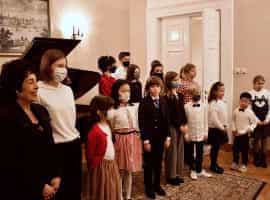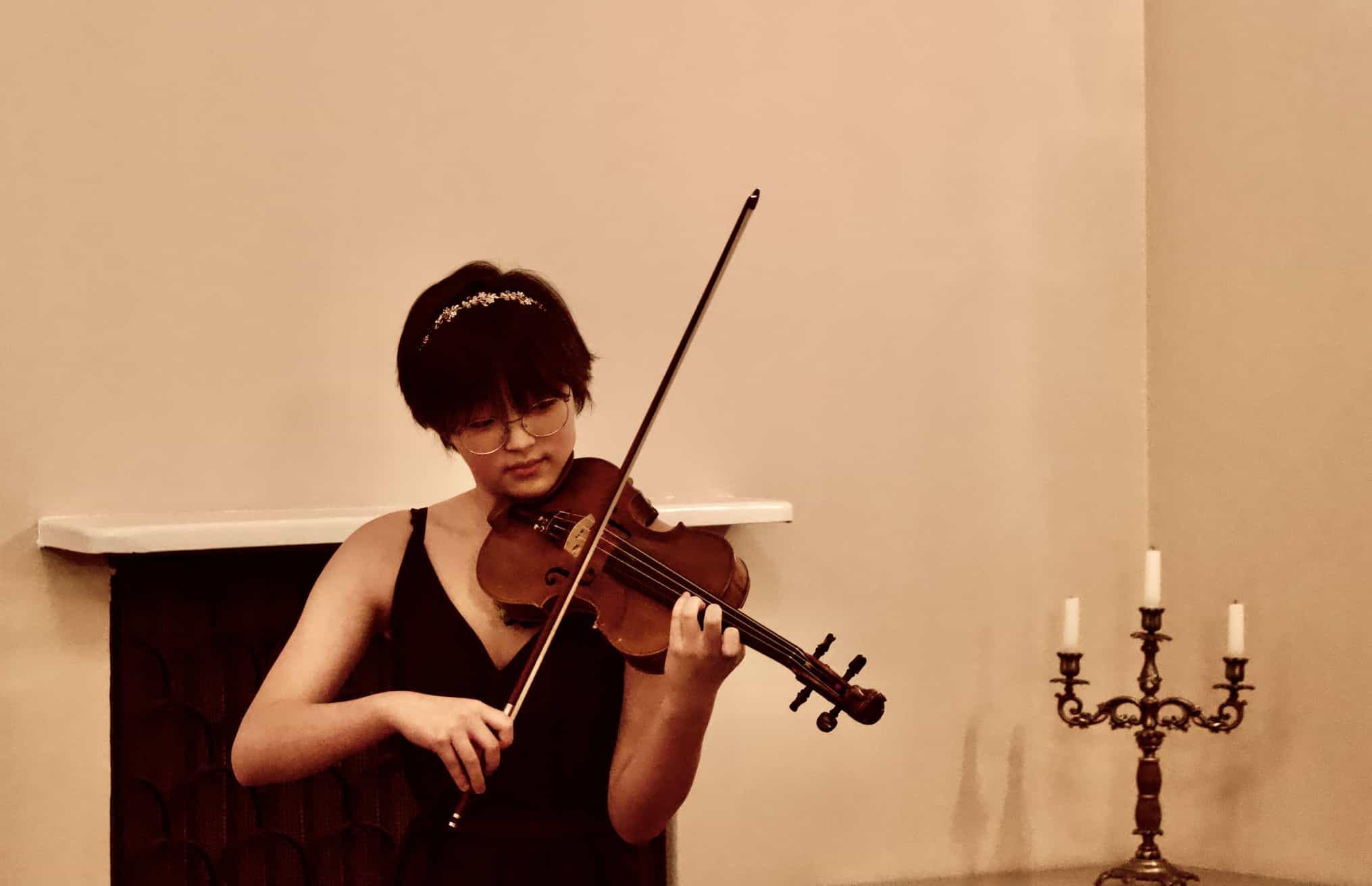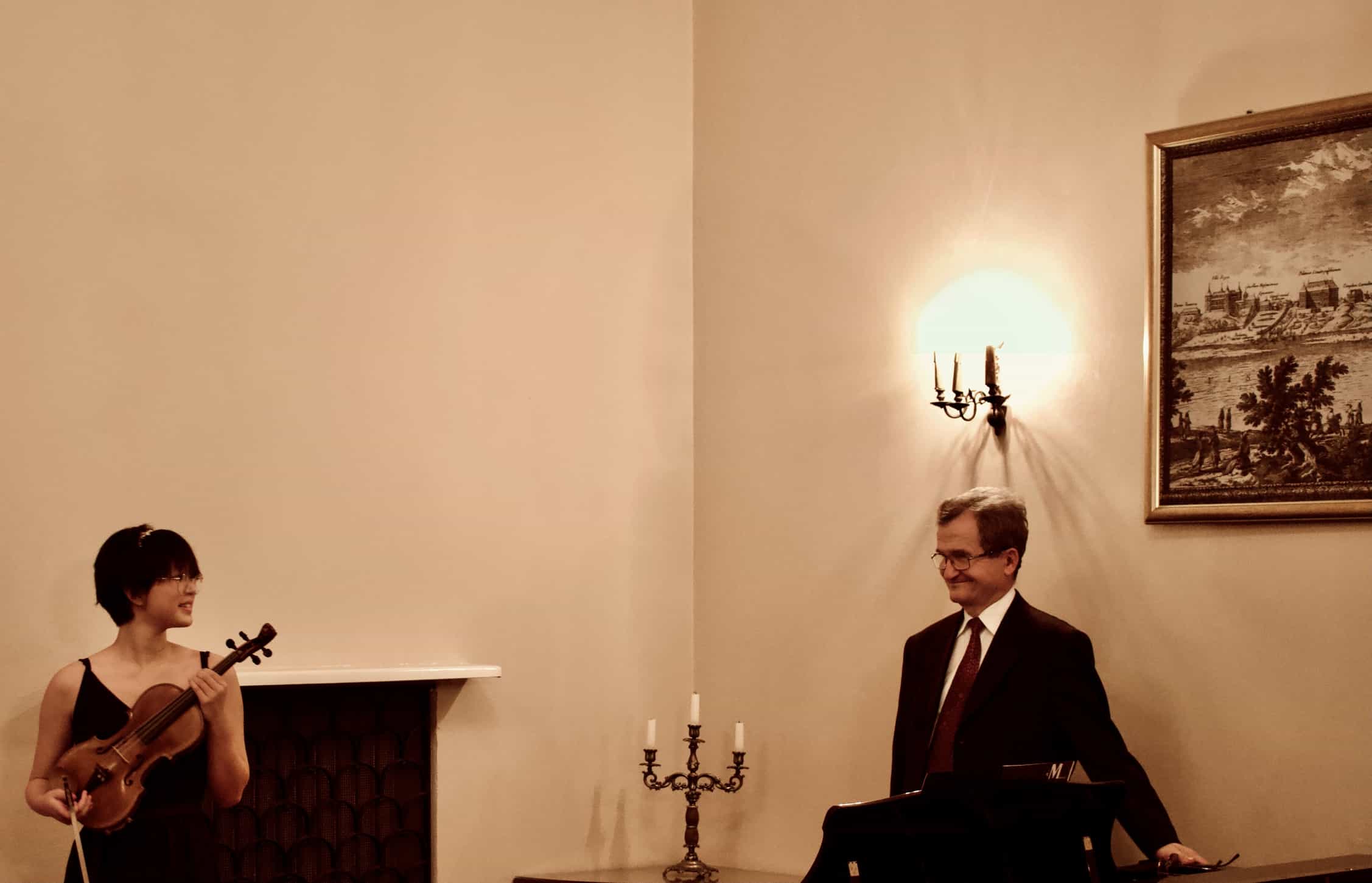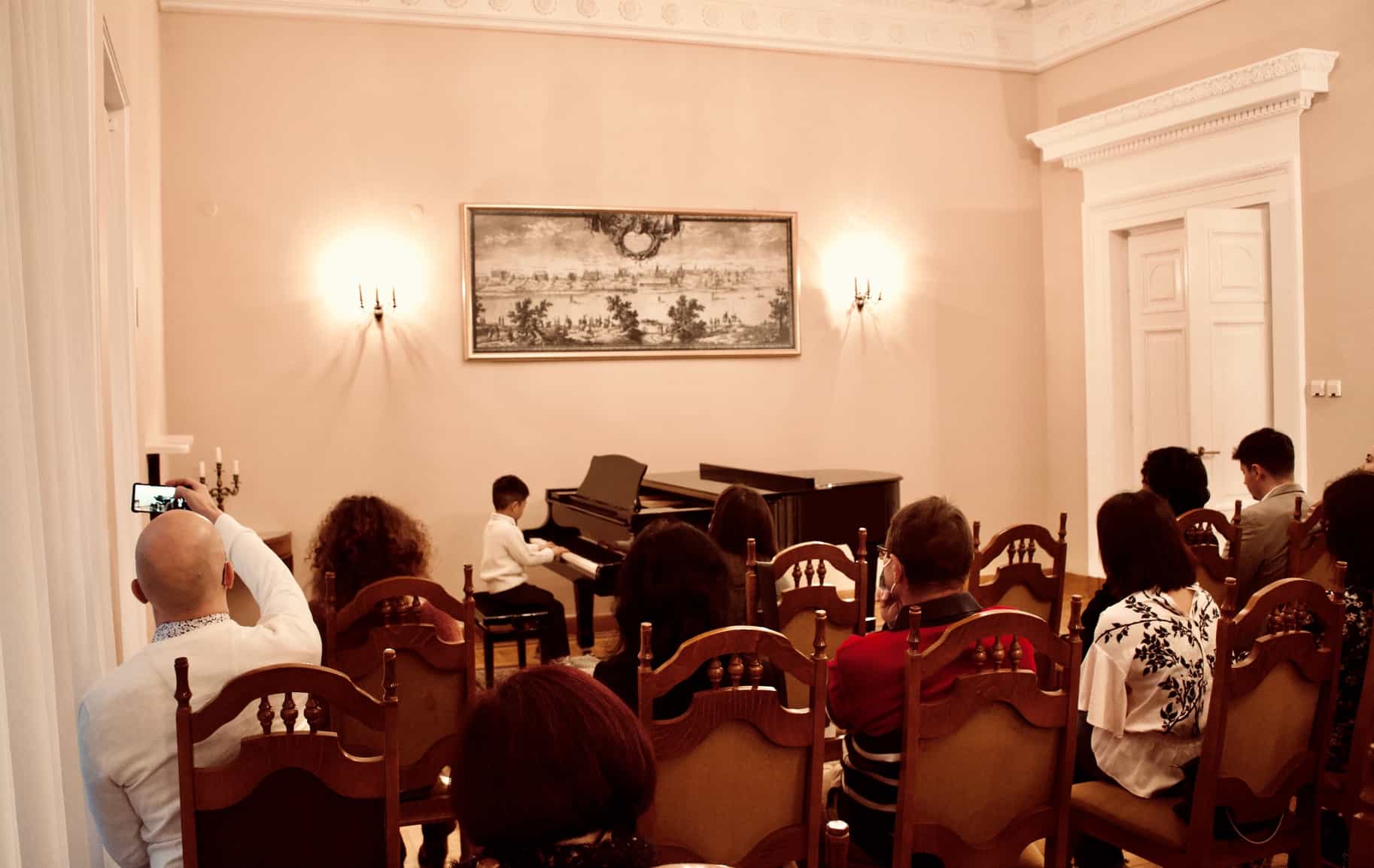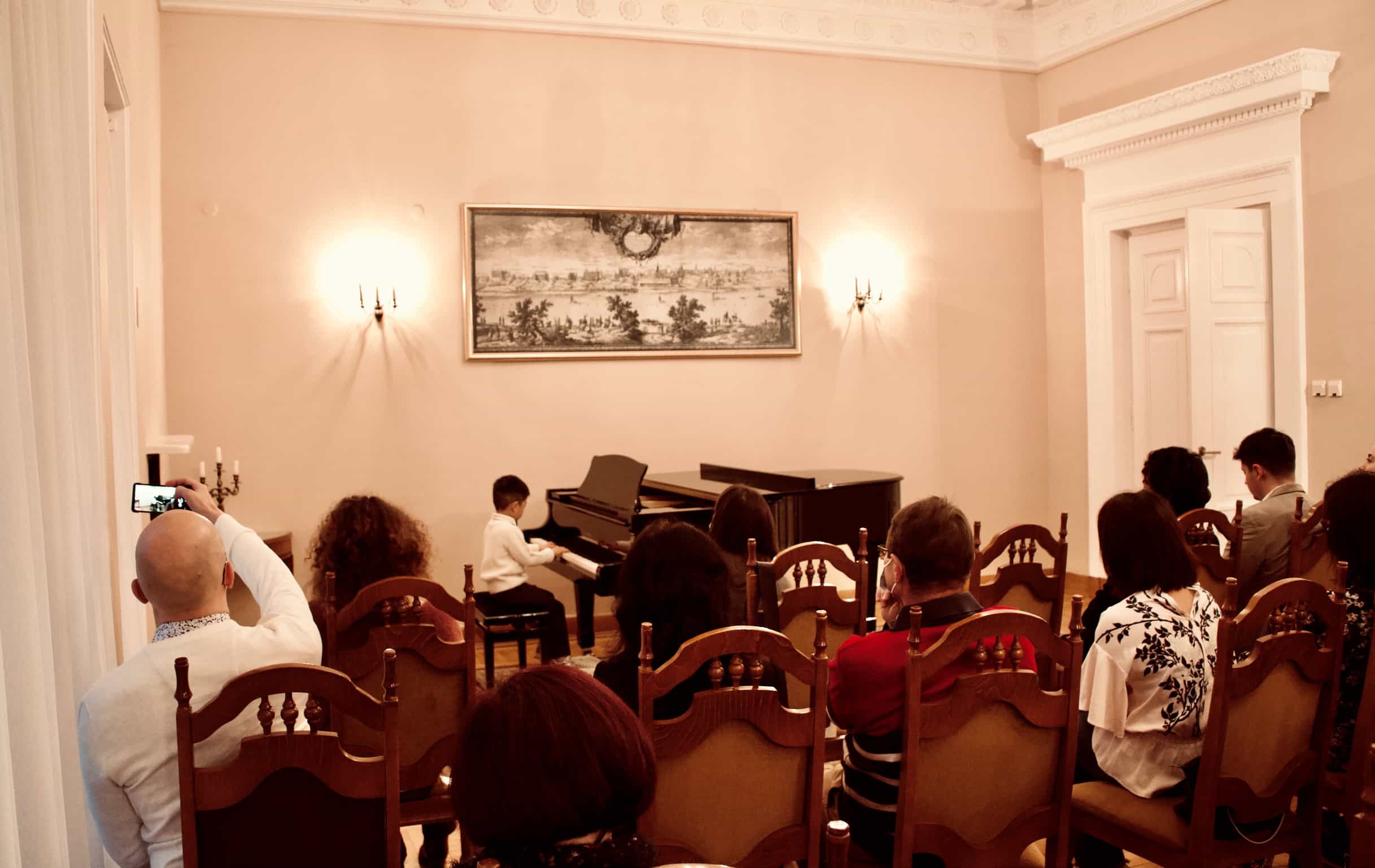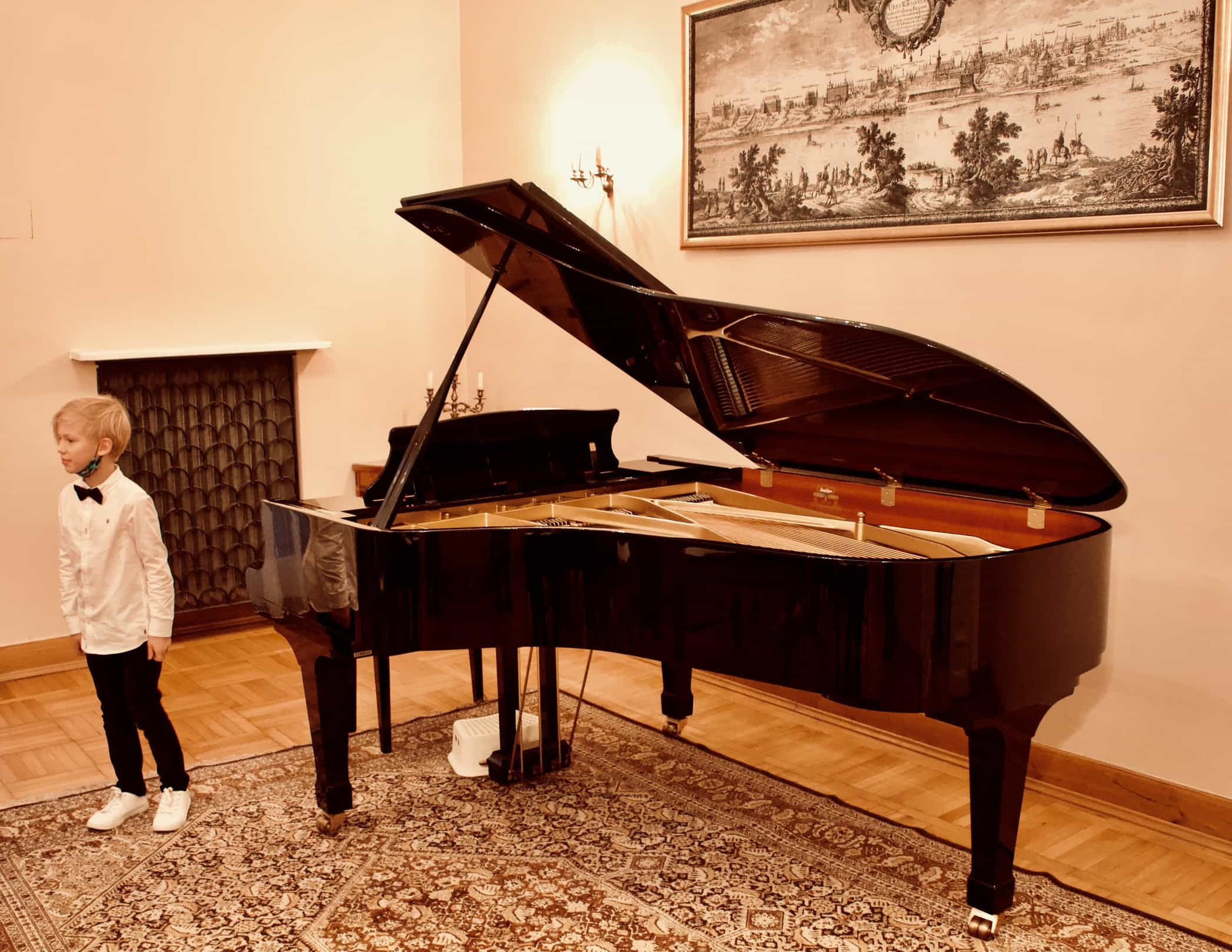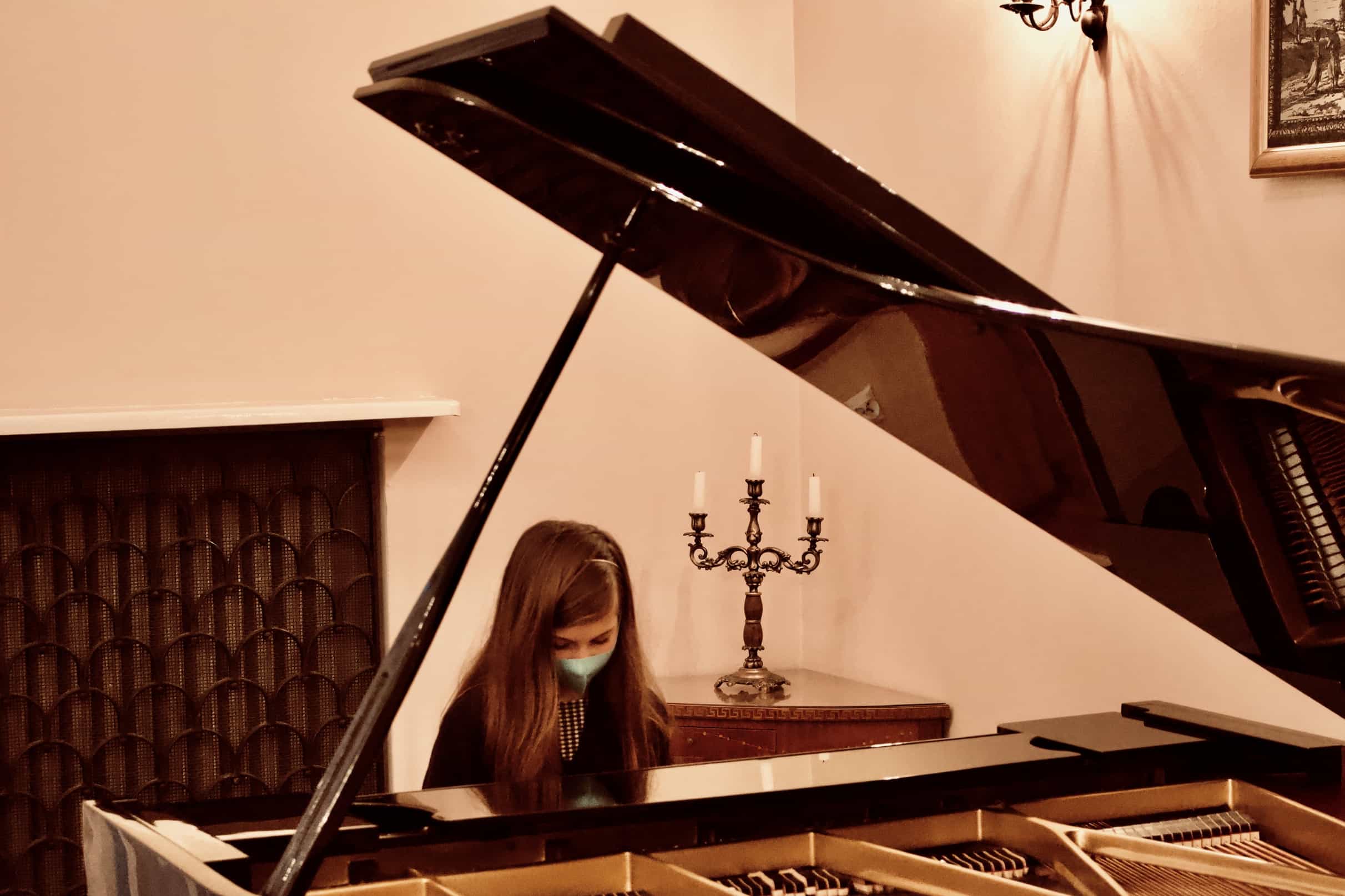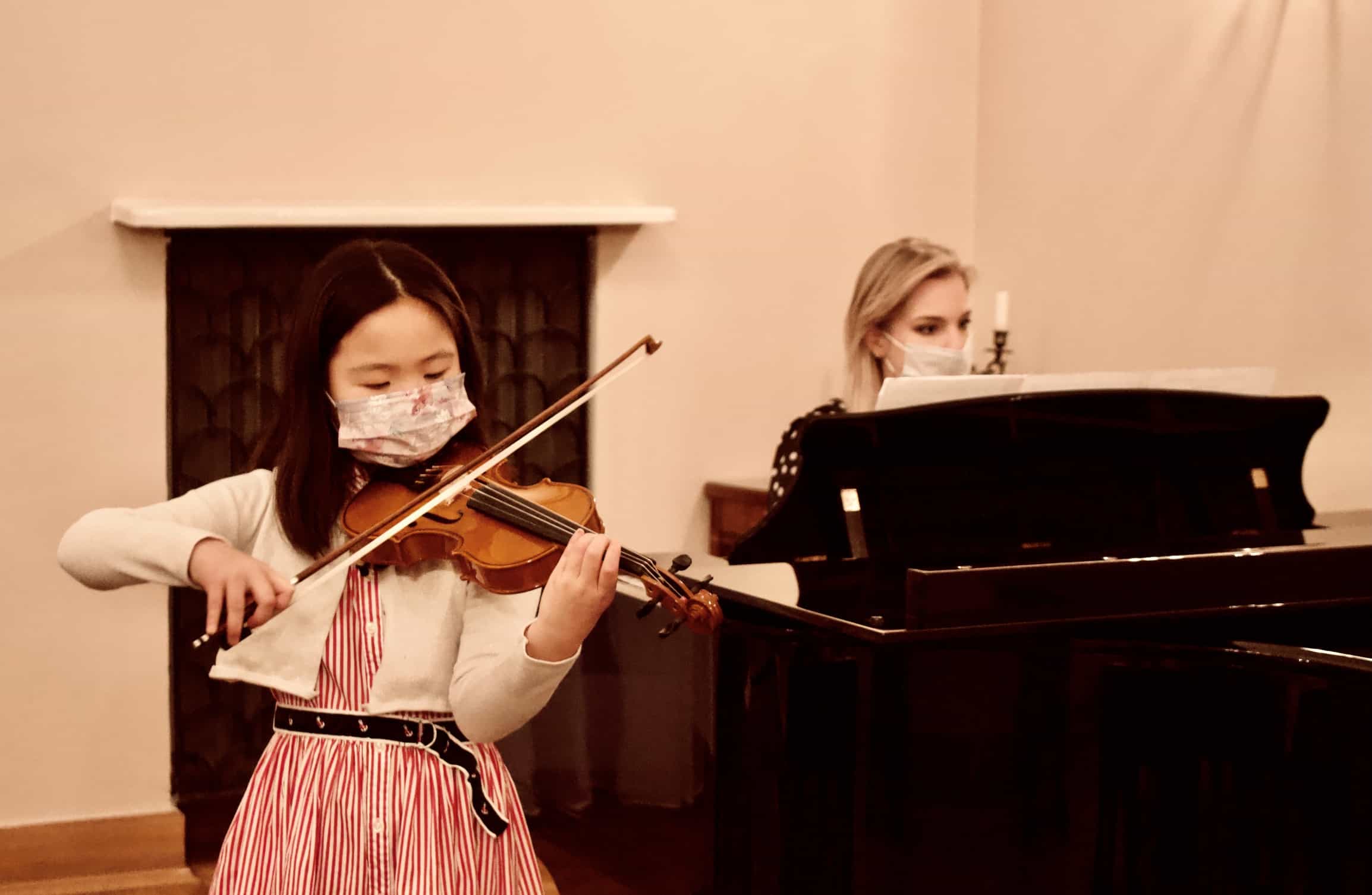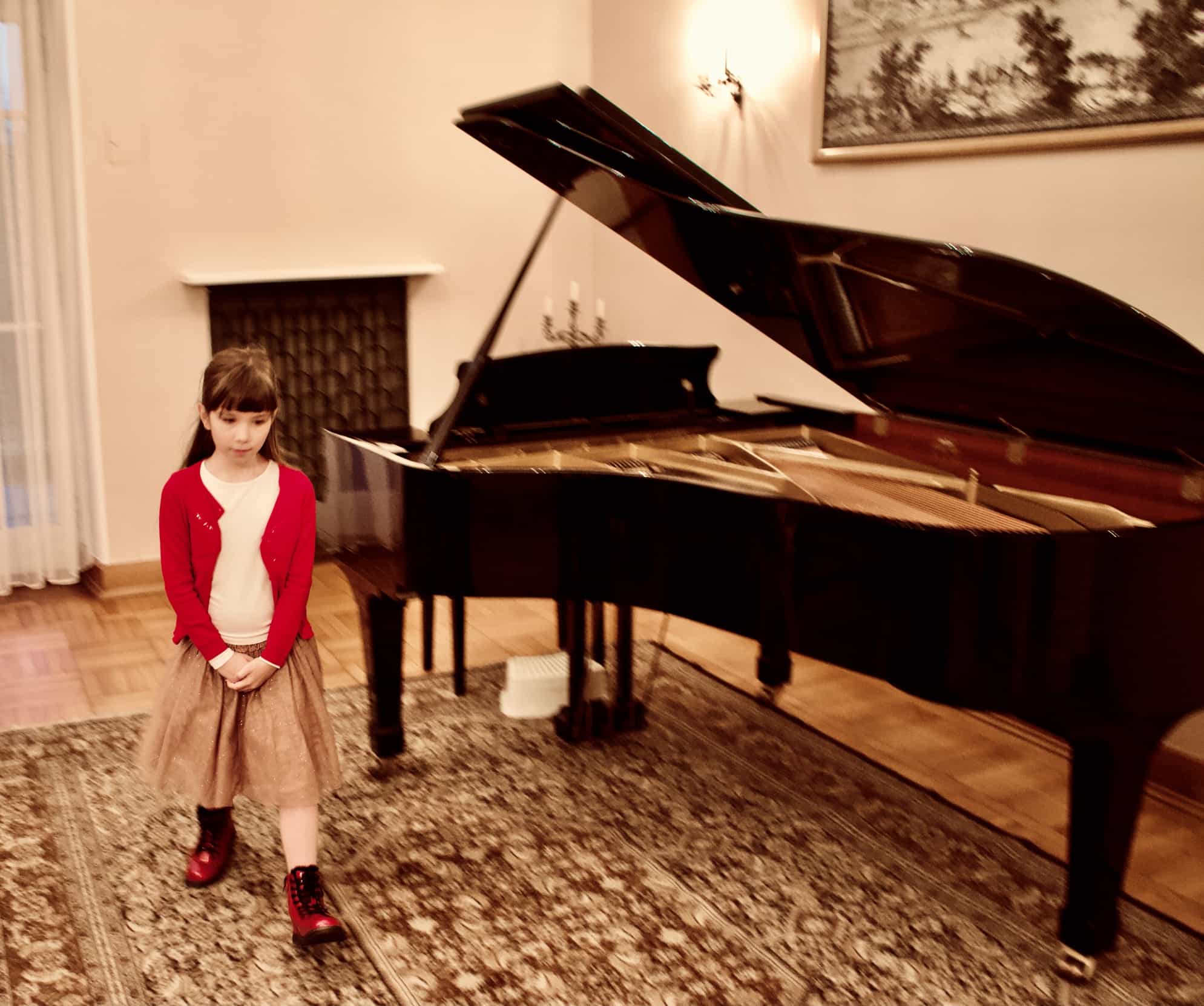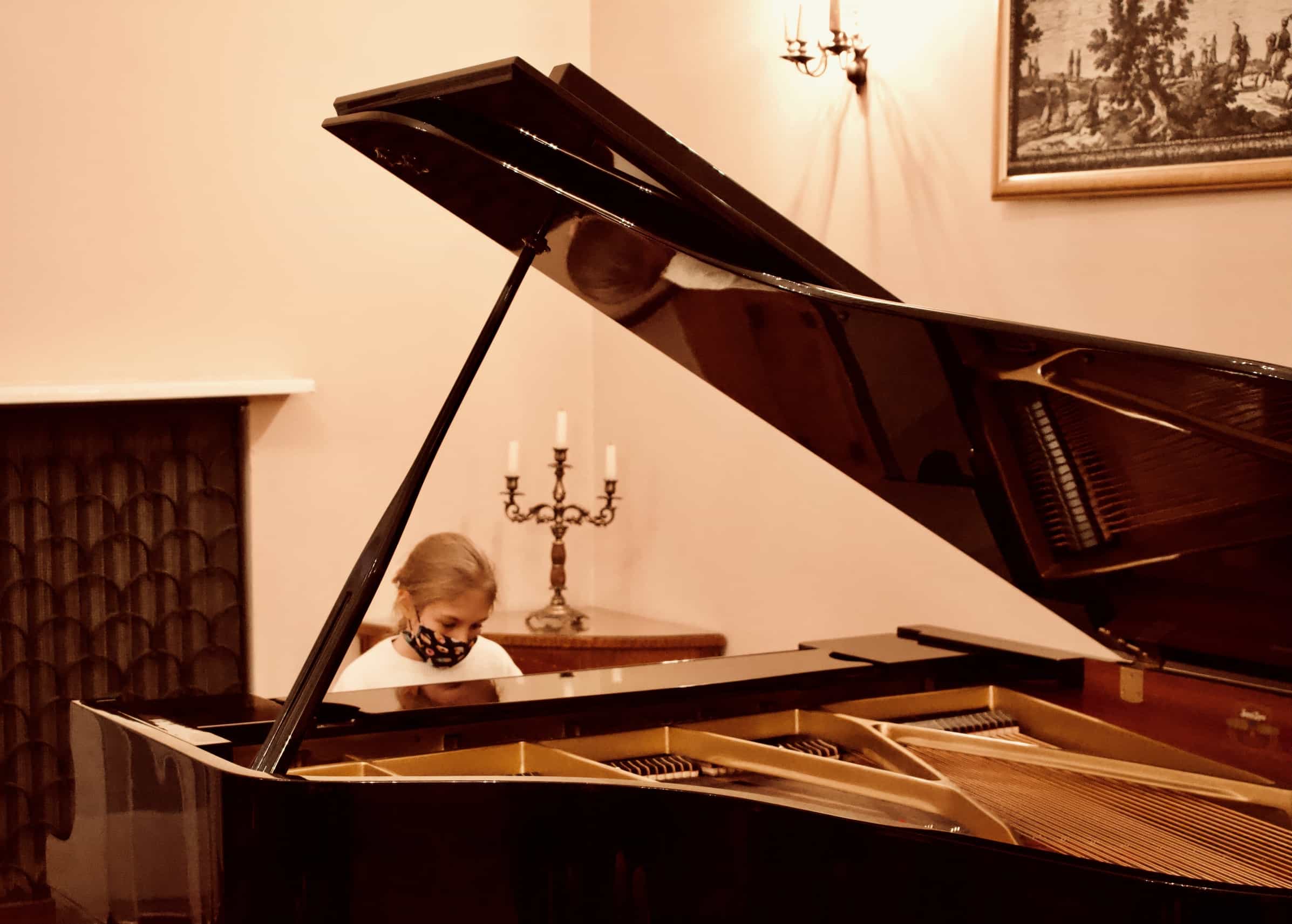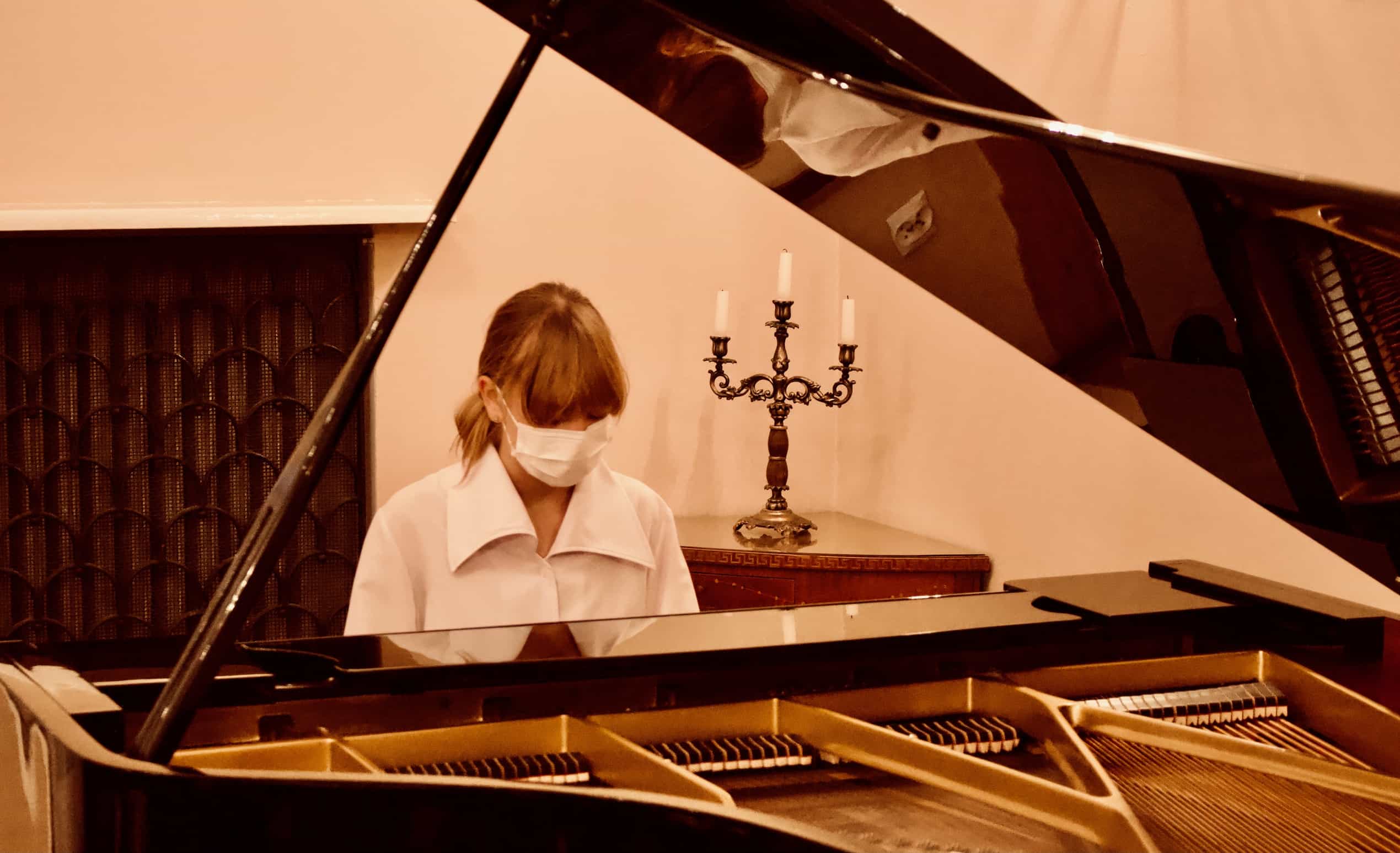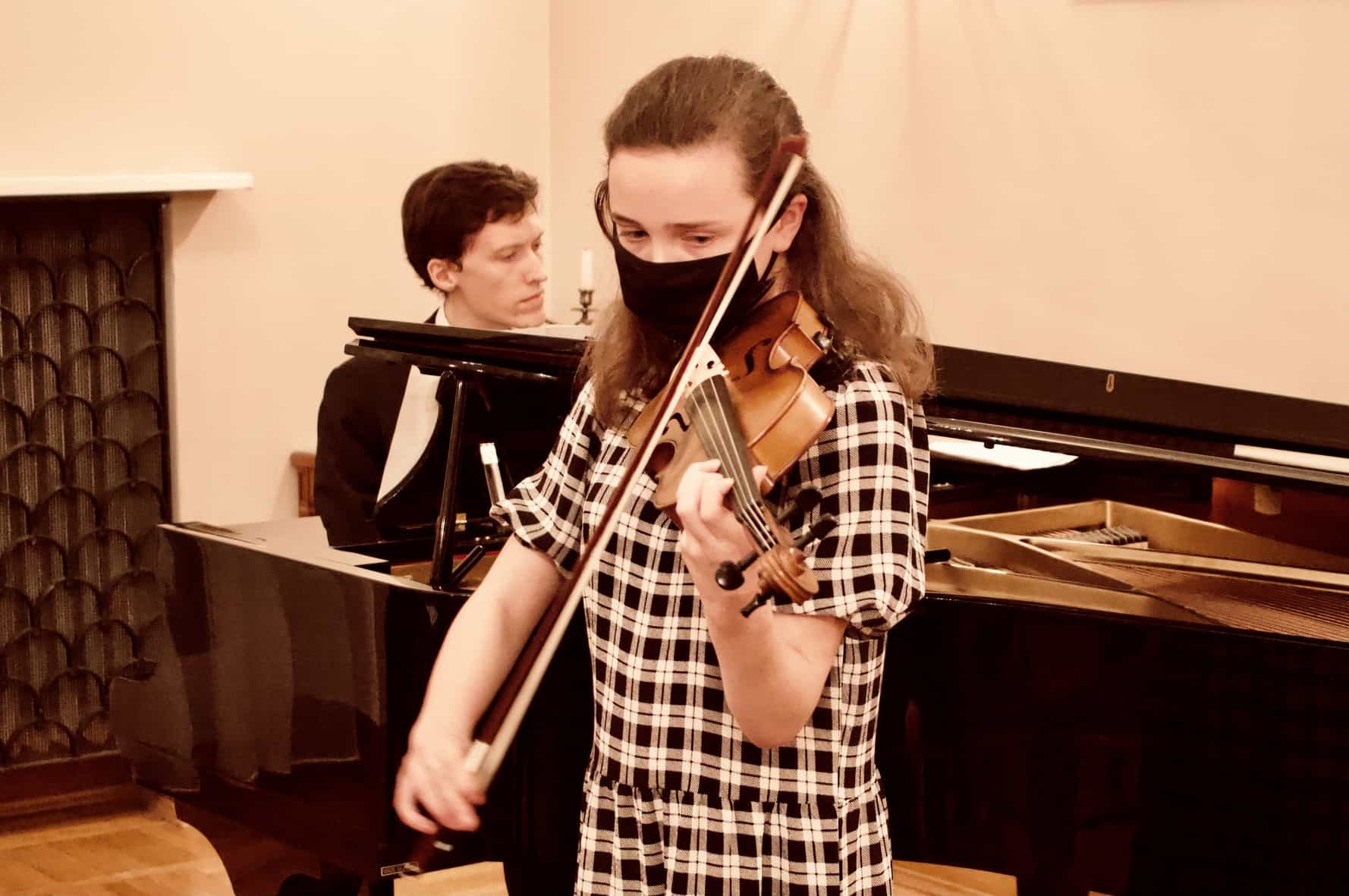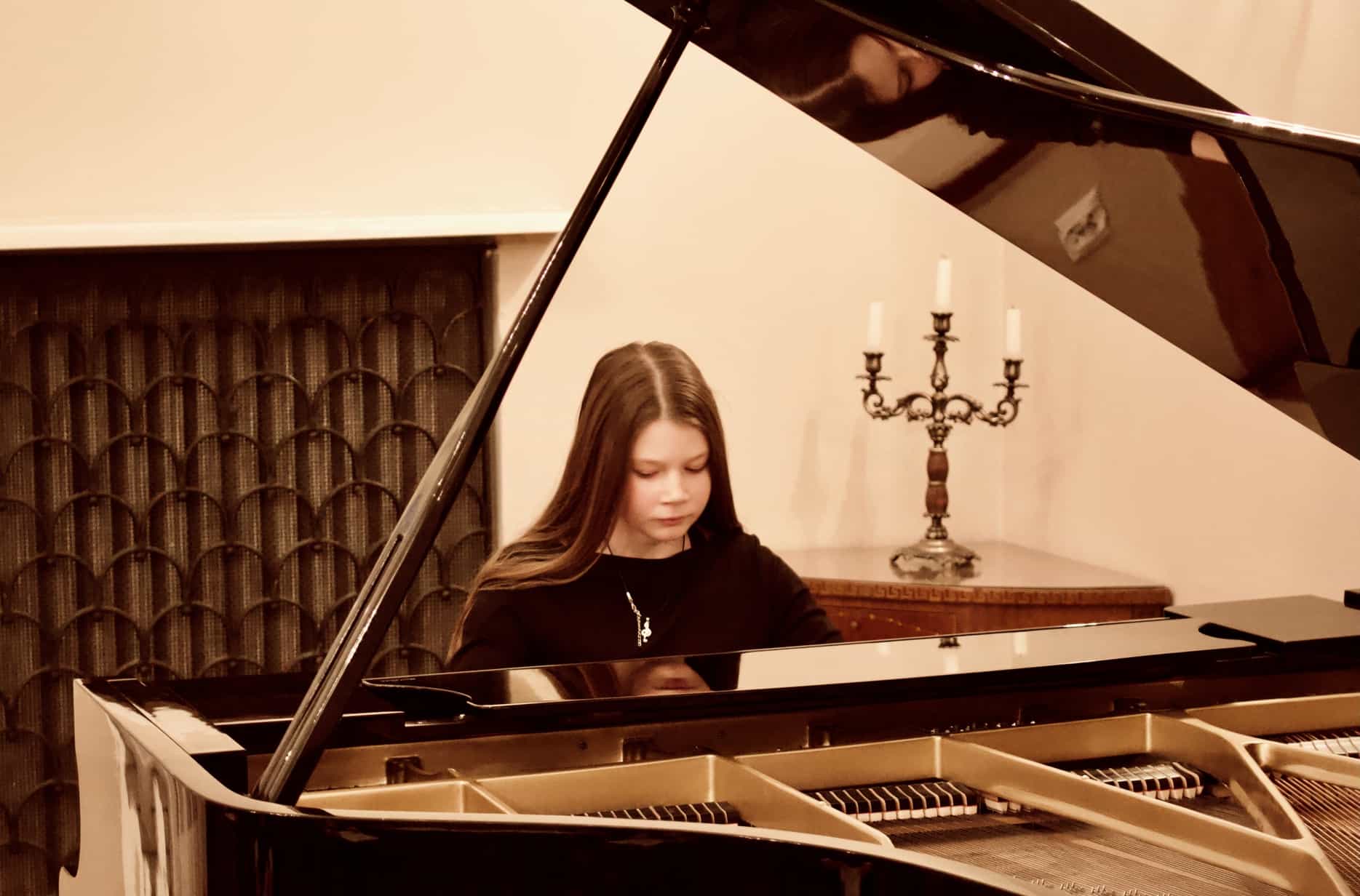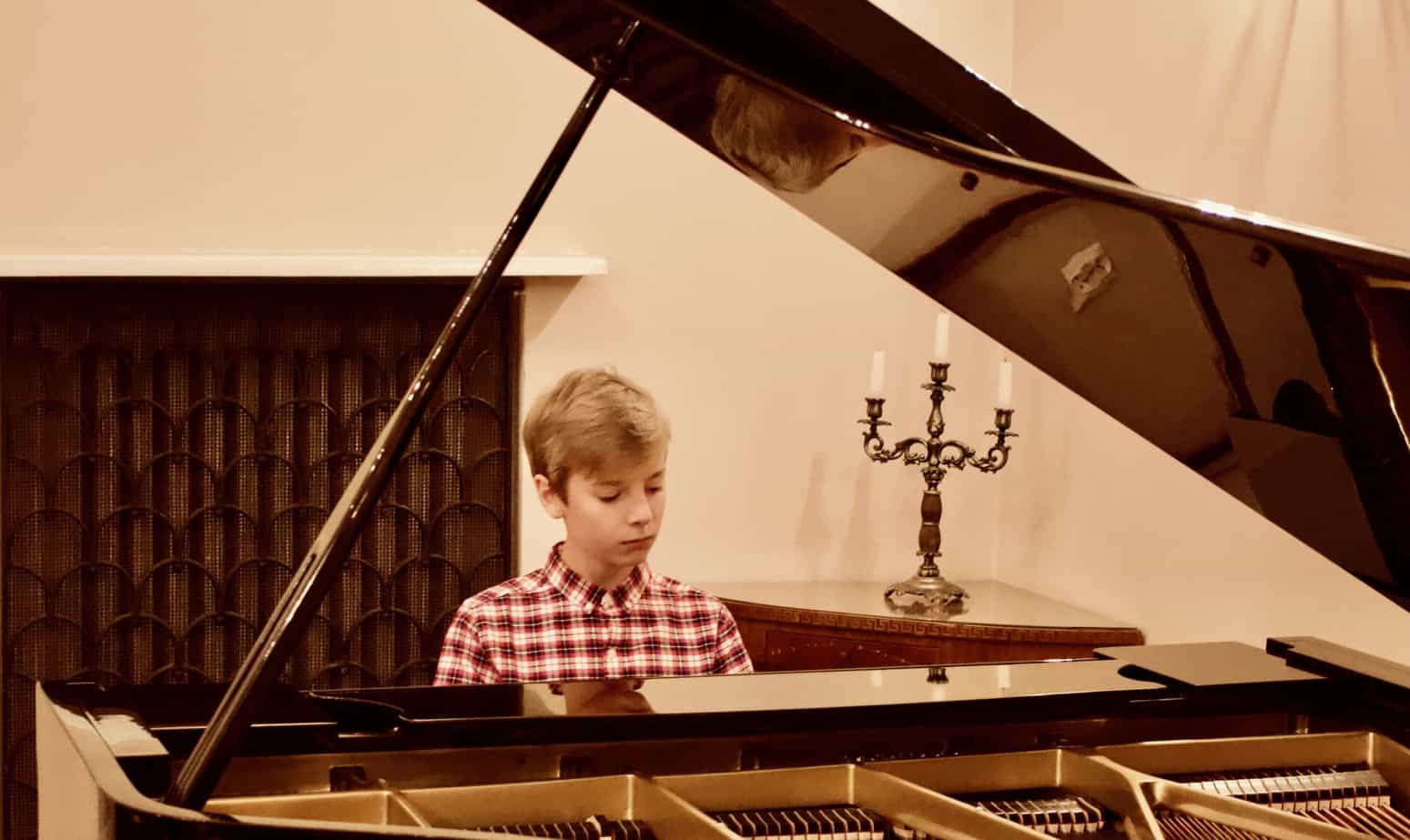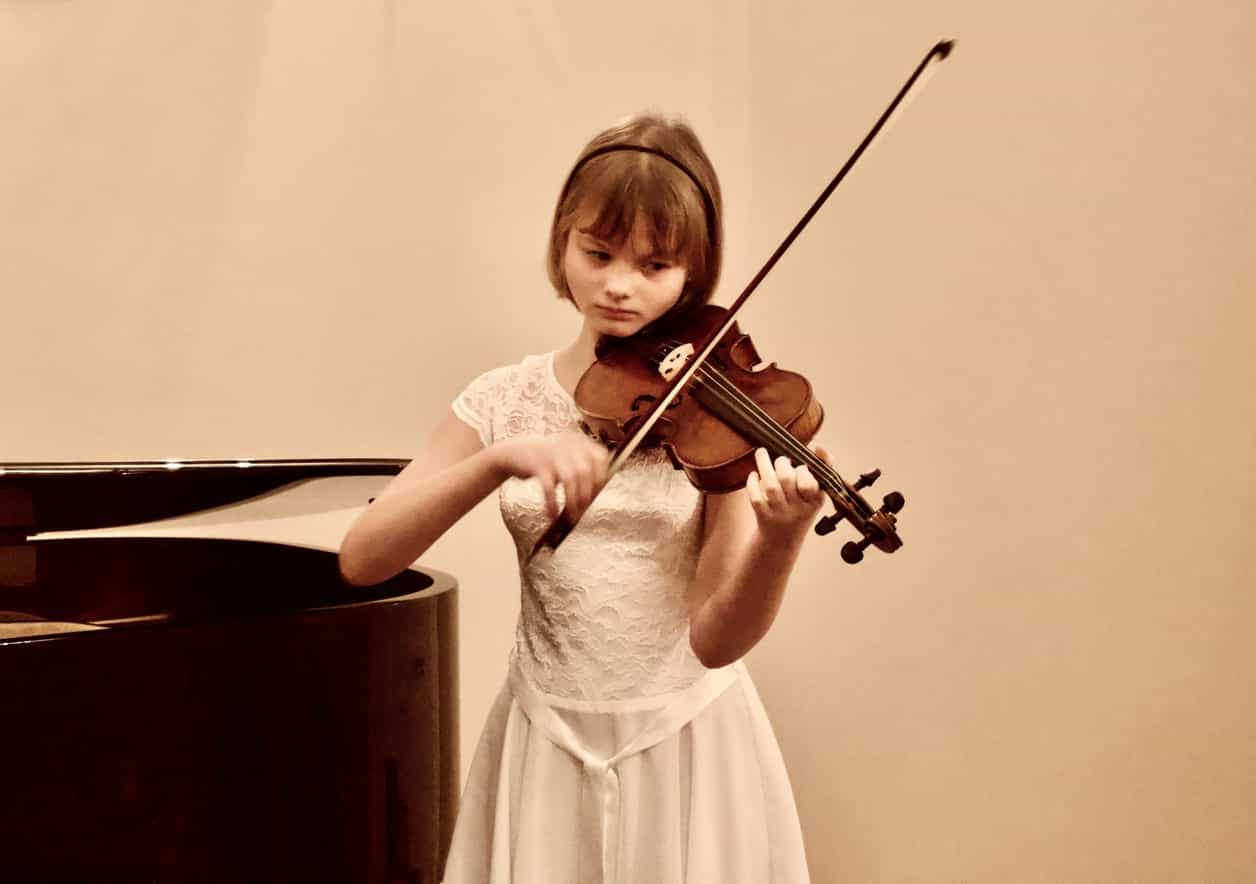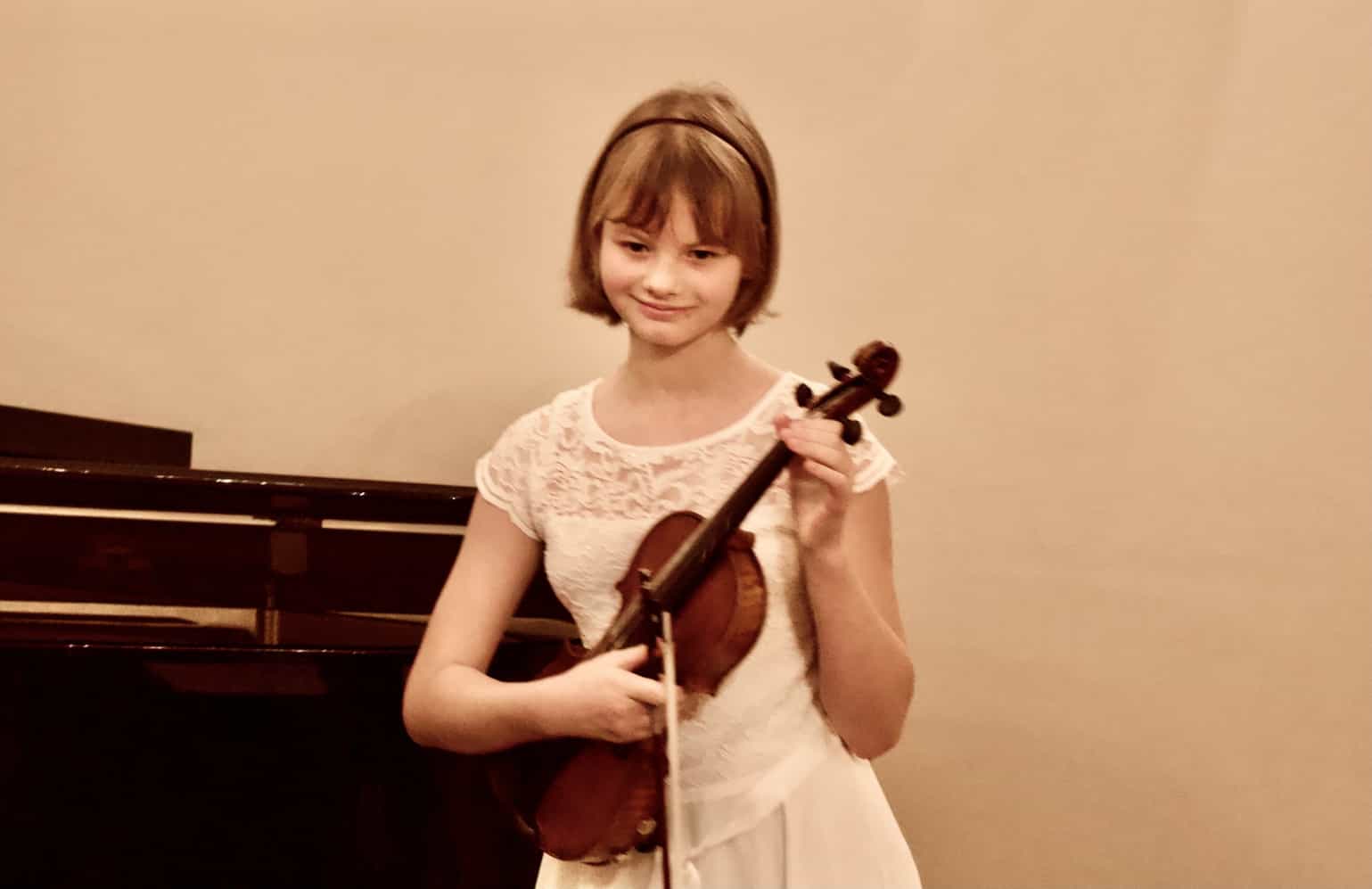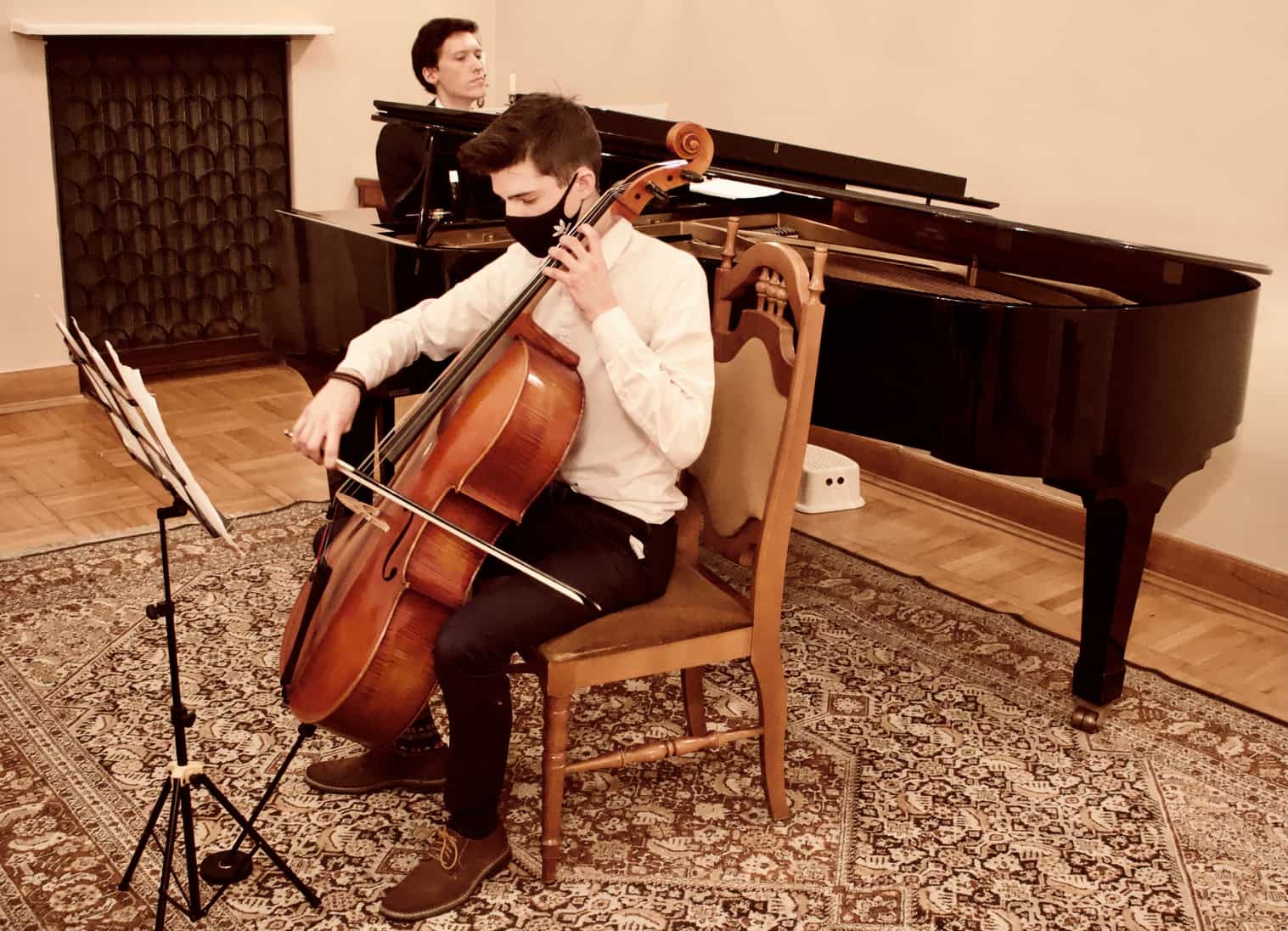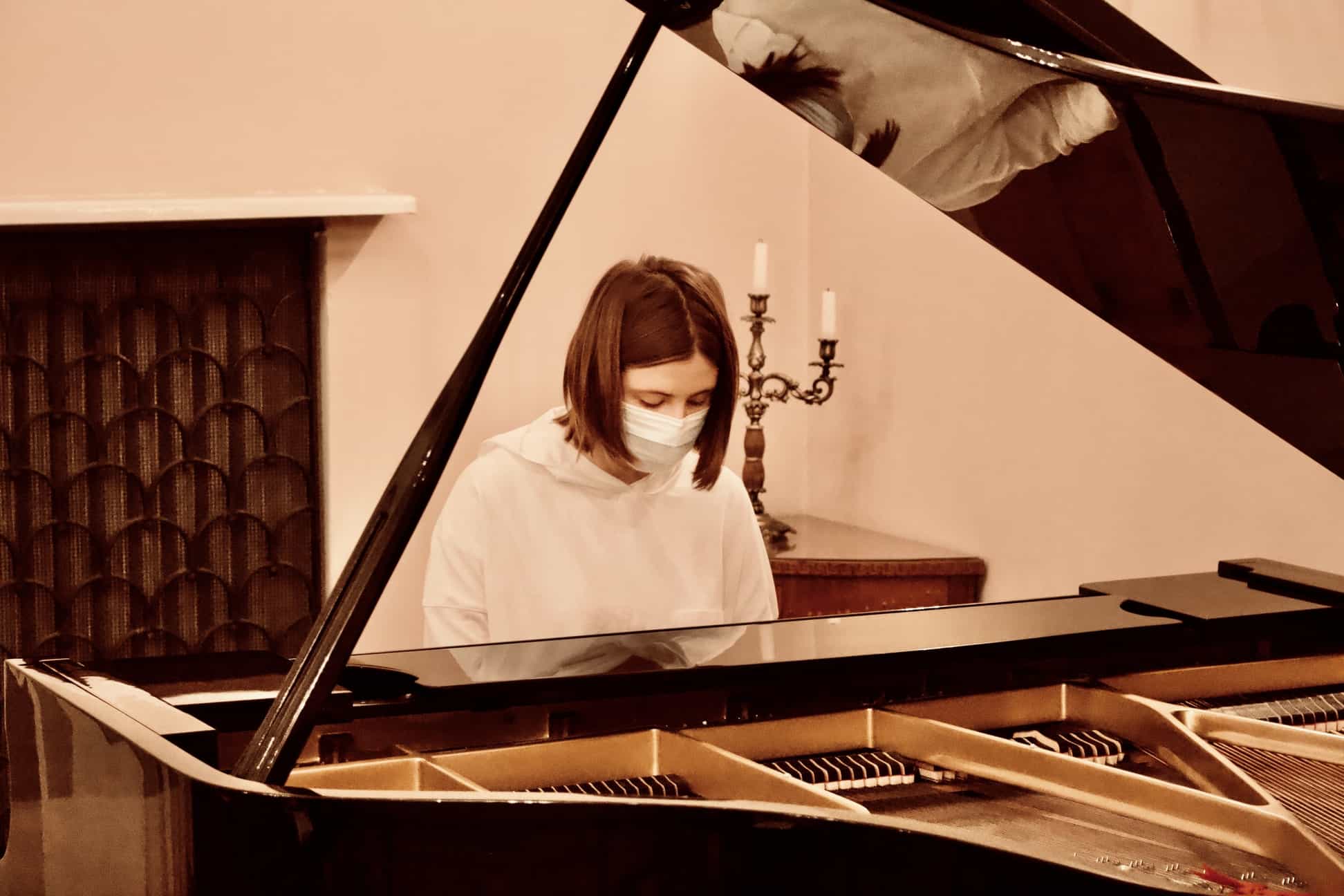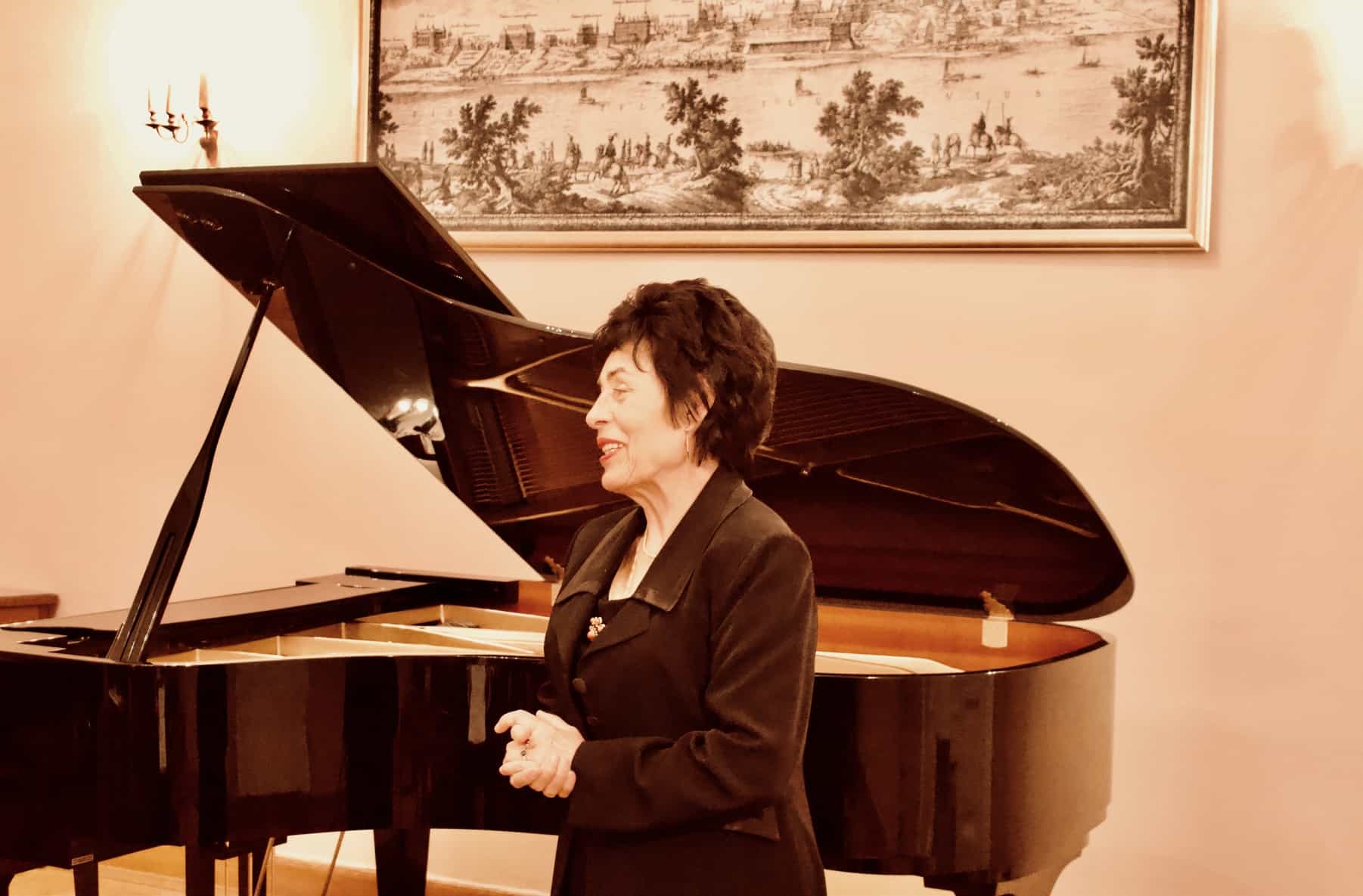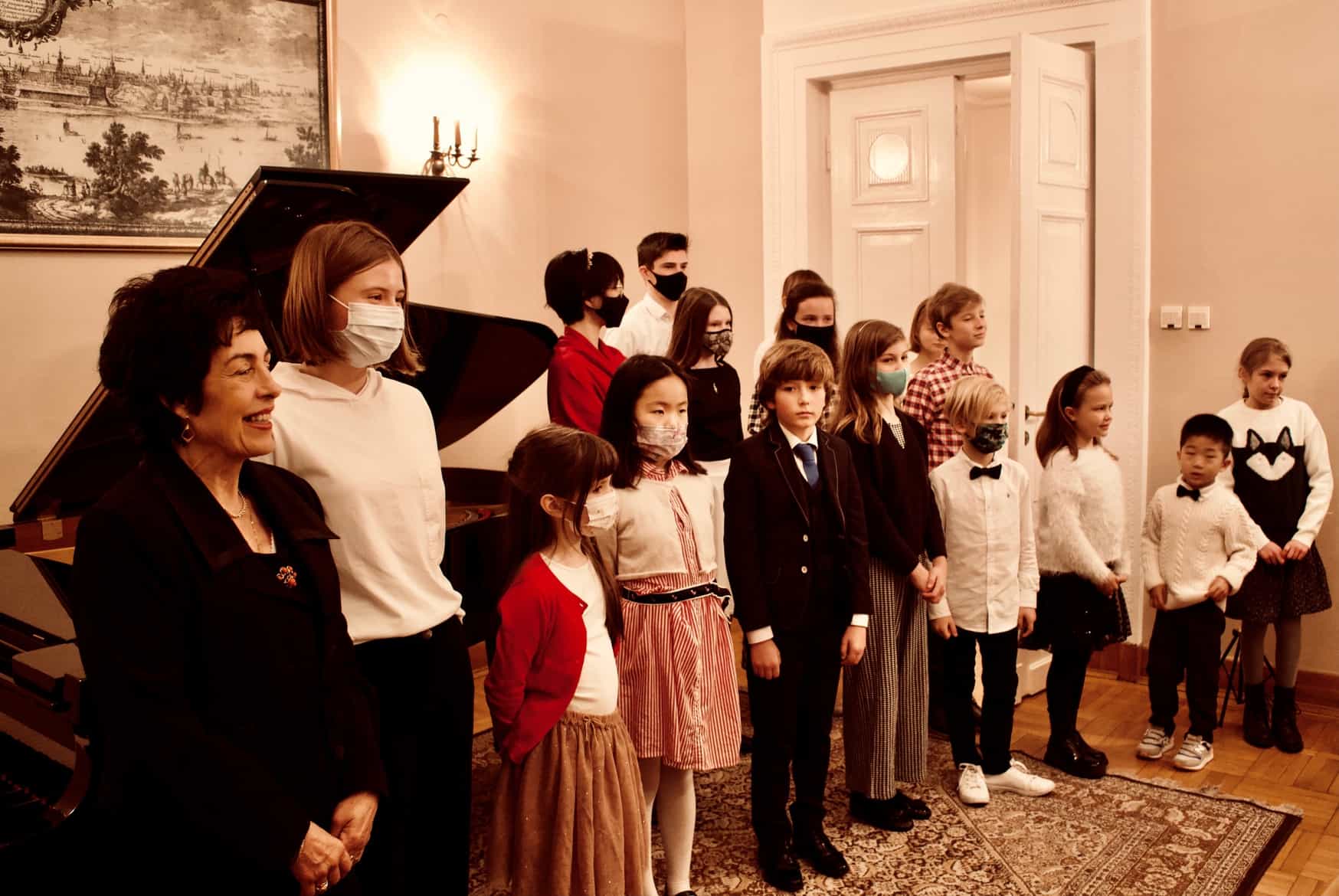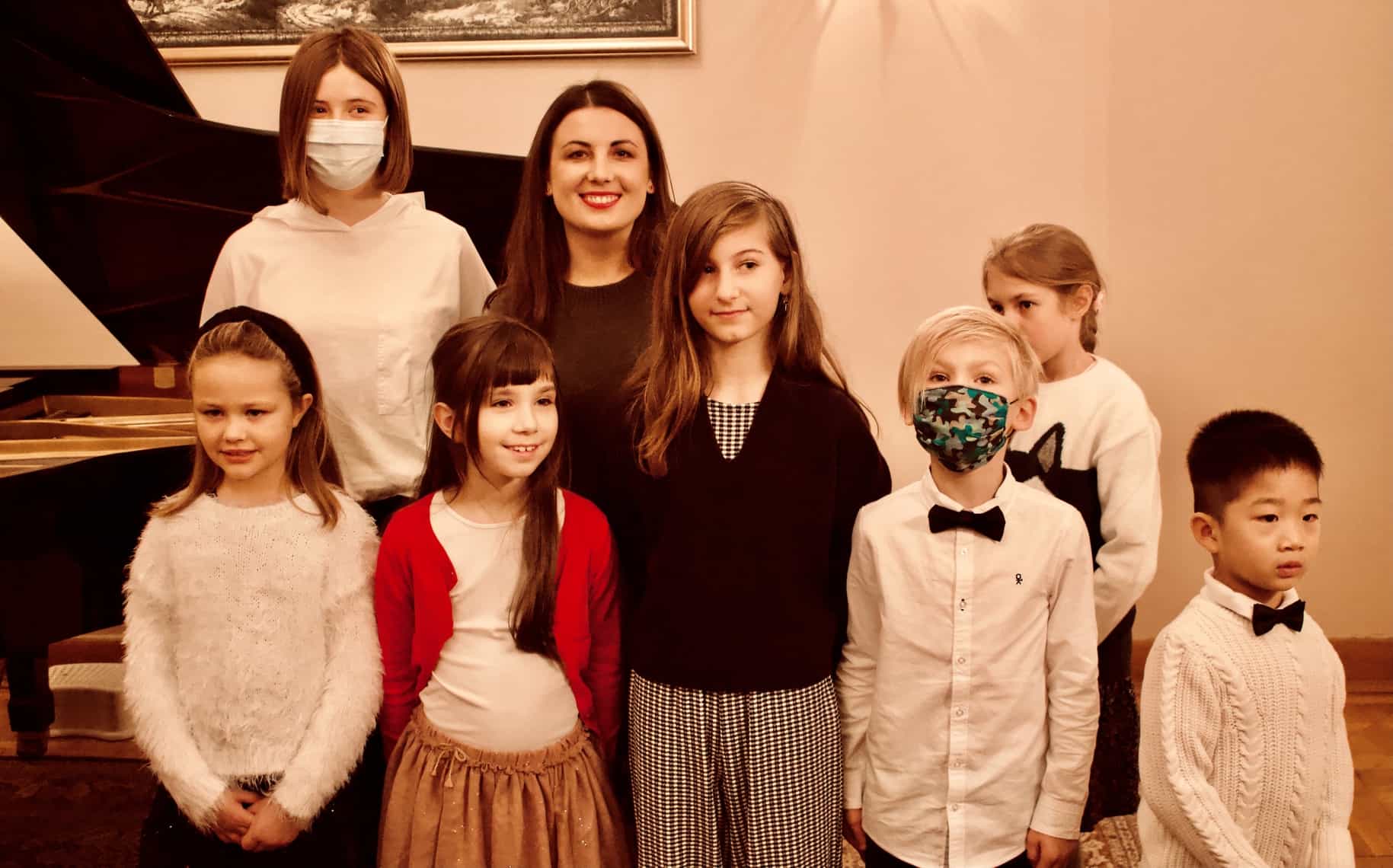To start with the Fall Concert 2021 was a special event for us, and we were able to come together again in 2021 to hear our students perform. In all honesty the music is a universal language that can bring together people from all cultures and backgrounds to share the joy of art. The event took place on November 14th at the Szustra Palace in Warsaw, a place where some of the most renowned Polish musicians have performed.
Below you can find pictures from the Fall Concert 2021:
This concert was also special because it featured three students who had started school less than three months earlier. Additionally this group included four-year-olds Freddy, Eliza, and Emil.
Fall season is special for us
The fall season is a special time of year at Unisono Music School. As the leaves begin to change and the air grows crisp, our students and teachers alike look forward to the annual Fall Concert. These concerts serve as a showcase for the hard work and dedication that our students have put into their musical pursuits over the past year.
As always, the Fall concerts feature a diverse lineup of classical music, including works by some of the most iconic composers in history. From the timeless melodies of Mozart and Beethoven to the intricate compositions of Bach and Handel, our students will have the opportunity to perform a wide range of music that represents different eras and styles.
In essence, classical music provides an emotional soundtrack to our journey through autumn. Its compositions evoke feelings of nostalgia for warm memories while embracing the promise of new beginnings. As we immerse ourselves in these timeless works this season, we are reminded that even in the midst of change and transformation, there is immense beauty in both loss and growth – an ever-present reminder mirrored by nature itself during this fleeting yet treasured time called autumn.
If you’re a music lover looking for a concert experience that truly stands out, we highly recommend attending one of our Fall concerts. You’ll be treated to some of the finest classical music in the area, all while supporting the talented and dedicated students at Unisono Music School. We look forward to seeing you there!
Commencement – Fall Concert 2021
The concert began with a performance by Ella Bai, a graduate of our School, who studied with Zofia Zwolińska. What is more, she is currently a student at the secondary music school in the class of Joanna Okoń (who is also a former student of Zofia Zwolińska).
Ella’s virtuoso performance included Nicola Paganini’s Caprice No. 9 Opus 1 for solo violin and Pablo Sarasate’s Gypsy Melodies. Ella was accompanied at the piano by Professor Andrzej Guz.
Not to mention Freddy was the first of our students to perform “Ode to Joy” by Ludwig van Beethoven and a folk song “Coming Round the Mountain”. As a matter of fact Freddy is a student of Julia Lewiuk’s piano class.
Yulia Lewiuk’s piano class were:
- Jeremi Filar with the folk song “Mr. John”
- Elisa Angevin performed with two miniatures by Ludmila Bass: “The Weariness” and Waltz
- Zosia Belgy performed Menuet in G Major by Johann Sebastian Bach
- We could hear Helenka in Agnieszka Lasko’s song “Little Big Elephant”.
- Basia Sobka played Minuet by Jean Philip Rameau and Bourre by Christoph Graupner
Dr Artur Chmara piano class performed:
- Julia Jedrzejczak, in whose performance we heard Gnosienne by Eric Satie
- Szymon Szysz performed Waltz in B minor by Fryderyk Chopin
and Ella Fitzgerald’s standard “Misty”. - Noora Hyttinen was heard in a Minuet from Sonata No. 2 by Maurice Ravel
- From Hanna Malaszek’s piano class performed
- Emil Koziel, who played: “Galop” by Josef Offenbach and Anna Martyniuk-Tofiluk Waltz
Zofia Zwolinska violin class performed:
- Hanyu Lang with Variations by Anatoly Komarovsky
- Emily Chandler, who we heard in Antonio Vivaldi’s Concerto in A Minor (Part III)
- Sam Chandler, Emily’s brother, a student in Maria Kosacka’s cello class, performed Allegro Appasionato
- Camille Saint-Saens
- From violin class of Piotr Nermer performed
- Maria Kwacz who performed “Sad Song” by Gieorgij Swiridow
- The concert was closed by Karolina Kowalska from Julia Lewiuk’s class. In her performance we heard the popular standard by Sam Wadgood – Shark Soup
We can argue that concerts are the key to music education. The events allow children to experience live music in person and understand the differences in performing versus practicing at home. Let alone traditional music education has been in decline in most institutions for several years. In fact arts is something we care about in these difficult times.
Furthermore with concerts schedule, students can now use all their skills to bring back the joy of learning about different pieces.
Ending of the Fall Concert 2021
Above all the music is core to our school life. The concert we experienced in November is one of the most amazing memories we have. Our school would not exist in this form without concert music. Here is our Fall 2021 Concert.
Last but not least we are already preparing for the Christmas Carol Concert. Moreover we will meet again in the Szustra Palace, whose interior echoes the sounds that resounded for years in the concert hall.
In the meantime, the Principal and professorial sends the best wishes all students, Parents and Supporters of our School
A bit of music education about composers is important
Learning about composers and their music is an important part of music education. Understanding the history and context of classical music can deepen our appreciation and understanding of the works we hear, and learning about the lives and contributions of individual composers can provide insight into the creative process and the cultural and historical influences that shaped their music.
Music of Christoph Graupner
Christoph Graupner was a 18th-century German composer and musician who is known for his contributions to the classical music repertoire. He was a prolific composer who produced a large body of work that includes a wide range of instrumental and vocal music, as well as opera and other stage works.
Graupner’s music is known for its technical demands and virtuosity, as well as its expressive melodies and beautiful harmonies. He composed a wide range of works for a variety of instruments, including violin, harpsichord, and other instruments, as well as ensemble works and vocal music.
Graupner’s music has had a lasting influence on classical music and has been widely performed and recorded by musicians around the world. He is considered a significant composer of the 18th century and is recognized for his contributions to the development of instrumental music.
Music of Maurice Ravel
Maurice Ravel was a 20th-century French composer and musician who is known for his contributions to the classical music repertoire. He was a prolific composer who produced a large body of work that includes a wide range of instrumental and vocal music, as well as opera and other stage works.
Ravel’s music is known for its technical demands and virtuosity, as well as its expressive melodies and beautiful harmonies. He composed a wide range of works for a variety of instruments, including piano, violin, and other instruments, as well as ensemble works and vocal music.
Ravel’s music has had a lasting influence on classical music and has been widely performed and recorded by musicians around the world. He is considered a significant composer of the 20th century and is recognized for his contributions to the development of instrumental music.
Music of Anatoly Komarovsky
Anatoly Komarovsky was a 20th-century Russian composer and musician who is known for his contributions to the classical music repertoire. He was a prolific composer who produced a large body of work that includes a wide range of instrumental and vocal music, as well as opera and other stage works.
Komarovsky’s music is known for its technical demands and virtuosity, as well as its expressive melodies and beautiful harmonies. He composed a wide range of works for a variety of instruments, including piano, violin, and other instruments, as well as ensemble works and vocal music.
Komarovsky’s music has had a lasting influence on classical music and has been widely performed and recorded by musicians around the world. He is considered a significant composer of the 20th century and is recognized for his contributions to the development of instrumental music.
Quarterly music school concerts as a part of tuition
Quarterly music school concerts provide an essential platform for students to showcase their progress, gain performance experience and develop their confidence. These concerts create a supportive environment that encourages students to overcome stage fright and push themselves beyond their limits. Performing in front of an audience is an essential part of the journey to mastering a musical instrument or developing vocal skills. It not only provides a valuable opportunity for self-expression, but also paves the way for personal growth.
These quarterly concerts also foster a sense of community among the students and their families. It is at these gatherings that parents connect with other parents who share similar interests and experiences. The shared pride and joy of witnessing the growth in each student’s abilities contributes greatly to building bonds within the music school community. In addition, these performances allow teachers and peers to provide constructive feedback to encourage further improvement in both technique and interpretation, while also fostering healthy competition between students.
Overall, quarterly school concerts play a vital role in the artistic development of young musicians, honing their skills and providing invaluable performance opportunities. Beyond the mastery of notes on a sheet of music or the flawless execution of intricate techniques, they enable students to express themselves confidently through the language of music, while fostering a close-knit community united by a shared passion.
One of the most important benefits of these concerts is the confidence they instil in young musicians. The nerves of going on stage can be overwhelming, but by performing regularly, students gradually become more comfortable and confident in front of an audience. In addition, the feedback they receive from teachers, peers and parents after each concert helps them to identify areas for improvement and further refine their skills. This process of continuous growth has proven to shape not only their technical abilities but also their overall musicality.
These quarterly concerts also serve as an opportunity for students to experiment with different genres or styles that may be outside their comfort zone. Encouraged by supportive teachers and fellow performers, many students take bold leaps into unfamiliar territory during these events – choosing pieces that challenge them both technically and emotionally. Such experimentation fosters creativity while broadening musical horizons.
Ultimately, incorporating quarterly music school concerts into the curriculum is much more than just another item on the academic calendar; it is an essential component of a holistic musical education that fosters perseverance, encourages collaboration, and builds confidence through performance practice. Fall Concert is part of this program.
